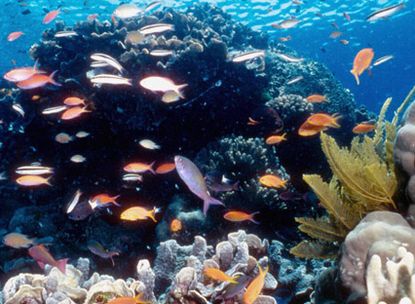Could heat-tolerant algae save coral reefs from climate change?
Scientists have ‘trained’ microalgae to tolerate higher sea temperatures

Scientists have developed heat-developed algae in a breakthrough that could help save endangered coral reeds.
The development has been revealed just months after Australia saw its third mass bleaching event in five years, amid record-high ocean temperatures at the Great Barrier Reef, as The Guardian reported at the time.
Coral bleaching occurs when rising sea temperatures cause corals to expel the colourful Symbiodiniaceae microalgae that live in their tissues and supply them with nutrients. As the algae is expelled, the corals lose their colour and starve to death.
Subscribe to The Week
Escape your echo chamber. Get the facts behind the news, plus analysis from multiple perspectives.

Sign up for The Week's Free Newsletters
From our morning news briefing to a weekly Good News Newsletter, get the best of The Week delivered directly to your inbox.
From our morning news briefing to a weekly Good News Newsletter, get the best of The Week delivered directly to your inbox.
But scientists at Australia’s Commonwealth Scientific and Industrial Research Organisation (CSIRO) have discovered that coral reefs could survive if the heat tolerance of their resident algae was raised, reports New Scientist.
Researchers from the national science agency and the University of Melbourne heated Symbiodiniaceae algae to 31°C in a laboratory for four years to train the organism to tolerate higher water temperatures. Over time, the algae evolved genetic changes that mean it could have greater heat resistance.
The researchers then took coral larvae from the Great Barrier Reef and mixed it with either standard algae or the heat-resistant algae before heating both blends to 31°C for one week. The coral with the “non-trained” algae quickly bleached, but the coral with the heat-resistant algae remained healthy.
Madeleine van Oppen of Melbourne University told The Times: “We found that the heat tolerant microalgae are better at photosynthesis and improve the heat response of the coral animal.
“These exciting findings show that the microalgae and the coral are in direct communication with each other. We’re putting all our efforts into this now in case we need it to have it ready as an intervention in the future.”
–––––––––––––––––––––––––––––––For a round-up of the most important stories from around the world - and a concise, refreshing and balanced take on the week’s news agenda - try The Week magazine. Start your trial subscription today –––––––––––––––––––––––––––––––
Create an account with the same email registered to your subscription to unlock access.
Sign up for Today's Best Articles in your inbox
A free daily email with the biggest news stories of the day – and the best features from TheWeek.com
Sorcha Bradley is a writer at The Week and a regular on “The Week Unwrapped” podcast. She worked at The Week magazine for a year and a half before taking up her current role with the digital team, where she mostly covers UK current affairs and politics. Before joining The Week, Sorcha worked at slow-news start-up Tortoise Media. She has also written for Sky News, The Sunday Times, the London Evening Standard and Grazia magazine, among other publications. She has a master’s in newspaper journalism from City, University of London, where she specialised in political journalism.
-
 Today's political cartoons - April 17, 2024
Today's political cartoons - April 17, 2024Cartoons Wednesday's cartoons - political anxiety, jury sorting hat, and more
By The Week US Published
-
 Arid Gulf states hit with year's worth of rain
Arid Gulf states hit with year's worth of rainSpeed Read The historic flooding in Dubai is tied to climate change
By Peter Weber, The Week US Published
-
 USC under fire for canceling valedictorian speech
USC under fire for canceling valedictorian speechSpeed Read Citing safety concerns, the university canceled a pro-Palestinian student's speech
By Rafi Schwartz, The Week US Published
-
 Arid Gulf states hit with year's worth of rain
Arid Gulf states hit with year's worth of rainSpeed Read The historic flooding in Dubai is tied to climate change
By Peter Weber, The Week US Published
-
 The growing thirst for camel milk
The growing thirst for camel milkUnder the radar Climate change and health-conscious consumers are pushing demand for nutrient-rich product – and the growth of industrialised farming
By Harriet Marsden, The Week UK Published
-
 Why curbing methane emissions is tricky in fight against climate change
Why curbing methane emissions is tricky in fight against climate changeThe Explainer Tackling the second most significant contributor to global warming could have an immediate impact
By Richard Windsor, The Week UK Published
-
 How the EU undermines its climate goals with animal farming subsidies
How the EU undermines its climate goals with animal farming subsidiesUnder the radar Bloc's agricultural policy incentivises carbon-intensive animal farming over growing crops, despite aims to be carbon-neutral
By Harriet Marsden, The Week UK Published
-
 Why are people and elephants fighting in Sri Lanka?
Why are people and elephants fighting in Sri Lanka?Under The Radar Farmers encroaching into elephant habitats has led to deaths on both sides
By Chas Newkey-Burden, The Week UK Published
-
 How climate change is contributing to global unrest
How climate change is contributing to global unrestIn Depth Some experts argue that global warming can be tied to rising levels of violence around the world
By Justin Klawans, The Week US Published
-
 Why last-chance tourism is the latest controversial travel trend
Why last-chance tourism is the latest controversial travel trendThe Explainer Race to visit places threatened by climate change 'before it's too late'
By Austin Chen, The Week UK Published
-
 The 5 biggest corporate greenwashing fines
The 5 biggest corporate greenwashing finesThe Explainer Pretending to be green can be expensive
By Devika Rao, The Week US Published